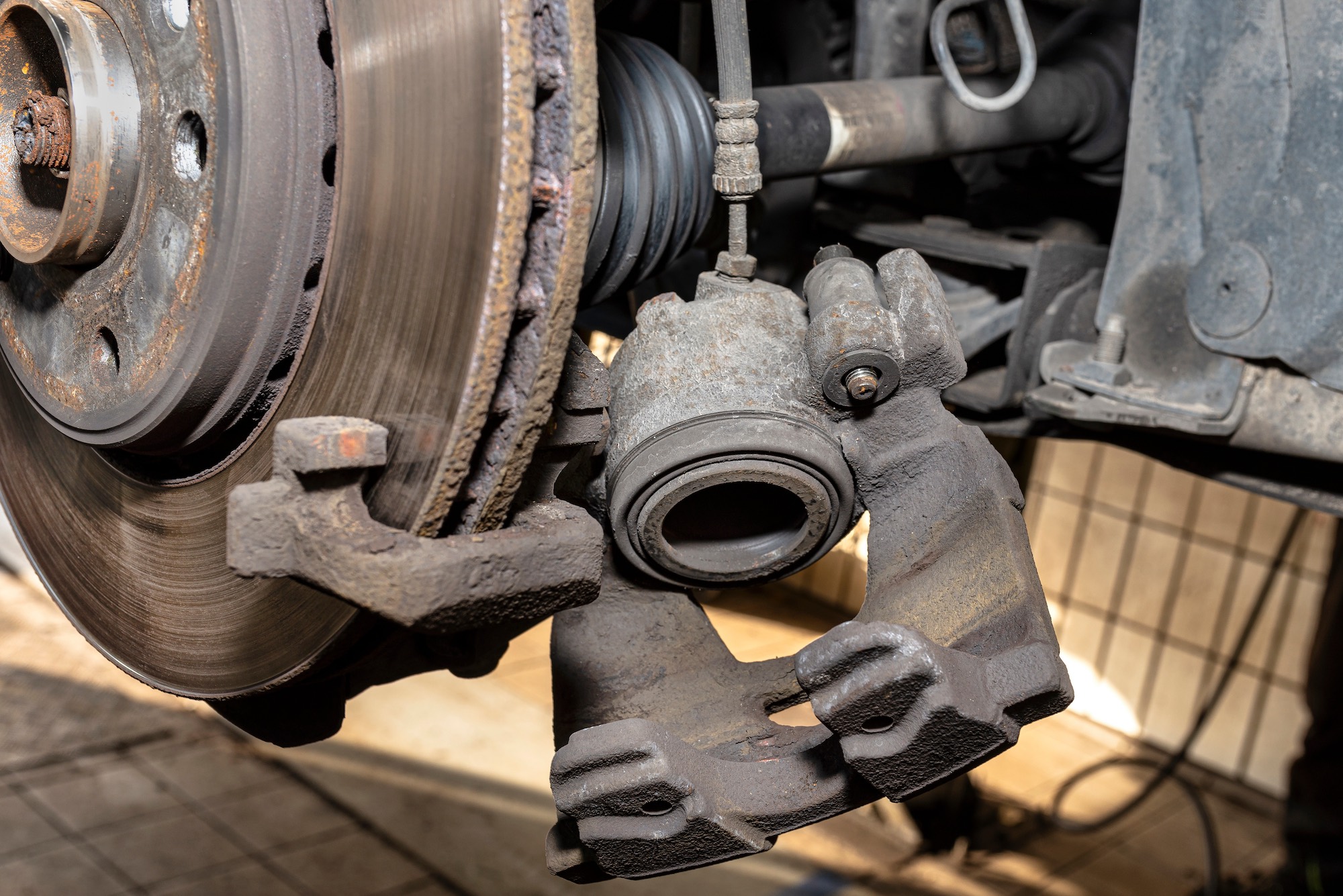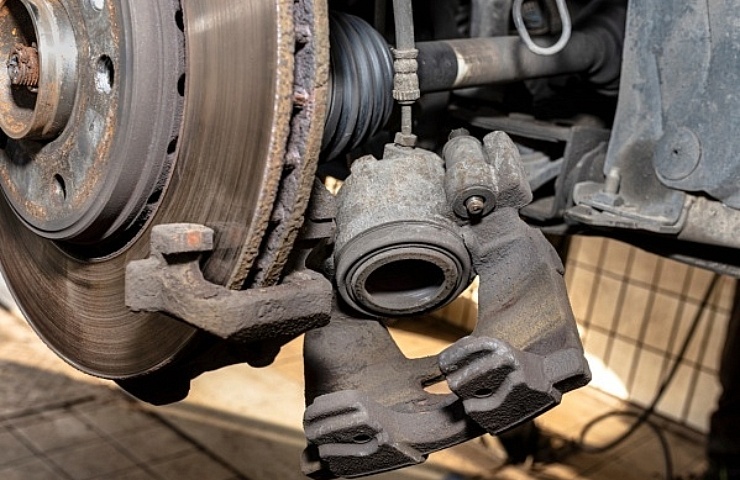How to Unstick Brake Calipers
To unstick brake calipers, you can try tapping them lightly with a mallet or using a brake caliper tool. Stuck brake calipers can lead to unsafe driving conditions, so addressing this issue promptly is crucial.
Neglecting stuck brake calipers can result in decreased braking performance, uneven brake pad wear, and potential damage to other brake components. By following a few simple steps, you can effectively resolve this problem and ensure your vehicle’s brakes are operating at optimal levels.
Remember to prioritize your safety and the safety of others on the road by maintaining your brakes in good working order.

Credit: m.youtube.com
Common Symptoms Of Stuck Brake Calipers
When brakes work correctly, they are essential for safe driving. However, stuck brake calipers can lead to dangerous situations. To avoid mishaps, it’s crucial to recognize the common symptoms of stuck brake calipers. Identifying these warning signs can help you address the issue promptly and ensure the safety of your vehicle and its passengers.
Brake Dragging
A noticeable symptom of stuck brake calipers is brake dragging. This occurs when one or more of the brake pads remain in constant contact with the rotor, leading to the vehicle feeling as though it’s slightly braking even when the pedal isn’t depressed. If you notice the car pulling to one side during braking or a dragging sensation, it may indicate a stuck brake caliper.
Uneven Brake Pad Wear
Uneven brake pad wear can also be a sign of stuck brake calipers. When a caliper sticks, it may cause the brake pad on that wheel to wear down faster than the others. This can result in uneven wear patterns on the brake pads, indicating a potential issue with the caliper. Keep an eye on your brake pads for any irregularities that may point to a stuck caliper.

Credit: www.ebay.com
Causes Of Stuck Brake Calipers
Brake calipers are crucial components in your vehicle’s braking system, but they can sometimes get stuck, causing safety hazards and performance issues. Let’s explore the common causes of stuck brake calipers:
Rust Or Corrosion
Rust and corrosion can form on the brake caliper piston or slides, hindering their movement and causing the brakes to stick.
Worn Brake Hardware
Worn caliper slide pins, bushings, or hardware can lead to uneven brake pad wear and caliper sticking issues.
Contaminated Brake Fluid
Contaminated brake fluid, due to moisture or debris, can cause corrosion inside the caliper, leading to sticking problems.
Tools And Materials Needed
Before starting the process of unsticking brake calipers, make sure you have the necessary tools and materials ready.
Jack And Jack Stands
- Ensures safety when working under the car
- Used to lift the vehicle off the ground
Socket Set
- Helps in removing the caliper bolts
- Allows for easy access to the brake components
Brake Cleaner
- Removes dirt, grease, and grime from the calipers
- Ensures optimal braking performance
Brake Lubricant
- Prevents calipers from sticking in the future
- Reduces friction in the braking system
Step-by-step Guide To Unstick Brake Calipers
How to unstick brake calipers? Follow this step-by-step guide to ensure your vehicle’s braking system works smoothly and effectively. Unsticking brake calipers is essential for maintaining your vehicle’s safety and performance. By following these simple steps, you can address and resolve the issue of stuck brake calipers efficiently.
Raise The Vehicle
Start by parking the car on a level surface and engaging the parking brake. Then, using a car jack, raise the vehicle to a suitable height, allowing enough space to access the wheels and brake calipers.
Remove The Wheel
Use a lug wrench to loosen the lug nuts, then carefully remove the wheel to gain access to the brake caliper assembly.
Inspect The Caliper
Examine the brake caliper for any signs of rust, debris, or damage. Check the caliper’s bolts and slides for any signs of wear or corrosion that may be contributing to the sticking issue.
Clean And Lubricate Caliper Slides
Thoroughly clean the caliper slides and bolts using a suitable brake cleaner to remove any dirt, grime, or debris. Apply a liberal amount of brake grease to the slides to ensure they move freely, allowing the caliper to operate smoothly.
Reassemble And Test
After ensuring the caliper slides are properly lubricated, reassemble the brake components and secure the wheel. Lower the vehicle, and then test the brakes to ensure they operate smoothly and effectively.
Preventive Maintenance And Troubleshooting Tips
The last thing you want when driving is to have brake calipers sticking and causing issues with your vehicle’s braking system. To prevent such costly and inconvenient situations, regular preventive maintenance is key. In this section, we will explore some important tips for preventing brake caliper sticking as well as troubleshooting potential issues. By following these tips, you can ensure your brake calipers remain in optimal condition and enjoy worry-free driving.
Regular Brake Inspections
Regular brake inspections are essential for identifying potential issues before they become major problems. By inspecting your brakes on a periodic basis, you can catch any signs of brake caliper sticking early on. During the inspection, pay attention to any unusual noises, vibrations, or uneven brake pad wear. If you notice any of these signs, it may indicate that your brake calipers are sticking.
Additionally, inspect the brake caliper slide pins and ensure they are properly lubricated. Over time, these pins can become dirty or dry, leading to caliper sticking. Applying a high-quality brake caliper lubricant can help prevent this issue and keep your brake calipers functioning smoothly.
Avoid Contaminated Brake Fluid
Contaminated brake fluid can contribute to brake caliper sticking. Over time, brake fluid can become contaminated with dirt, debris, or moisture, causing it to lose its effectiveness. To prevent this, it is important to regularly check the condition of your brake fluid and replace it if necessary.
An easy way to identify contaminated brake fluid is by its color. Healthy brake fluid tends to be clear or slightly yellow. If you notice a darker color or any signs of debris in your brake fluid, it is time for a replacement. Flushing the entire brake system and refilling it with fresh brake fluid can help prevent brake caliper sticking and ensure optimal braking performance.
Replace Worn Brake Hardware
Worn brake hardware can also lead to brake caliper sticking. Over time, brake pads, shims, clips, and other hardware can wear down or become damaged. When this happens, brake caliper movement can be restricted, resulting in sticking or uneven braking performance.
Regularly inspect all brake hardware components and replace any that show signs of wear or damage. This includes brake pads that have worn down to the minimum thickness and components that are corroded or distorted. By keeping your brake hardware in good condition, you can help prevent brake caliper sticking and maintain optimal braking efficiency.

Credit: www.ebay.com
Frequently Asked Questions For How To Unstick Brake Calipers
How Do You Free Up A Seized Brake Caliper?
To free up a seized brake caliper, follow these steps: 1. Lift the vehicle and remove the wheel. 2. Use a wrench to loosen the brake caliper bolts. 3. Tap the caliper gently with a rubber mallet to dislodge any rust.
4. Apply penetrating oil to the caliper pins and let it sit for a few minutes. 5. Use pliers or a C-clamp to compress the caliper piston.
How Do You Fix A Brake Caliper That Is Sticking?
To fix a sticking brake caliper, first clean and lubricate the caliper slides. Check for any damaged or worn out parts, such as seals or pistons, and replace them if necessary. Bleed the brake system to ensure there is no air in the lines, and test the brake operation.
Can A Stuck Caliper Become Unstuck?
Yes, a stuck caliper can become unstuck through proper diagnosis, repair, and maintenance by a qualified mechanic.
Why Is My Brake Caliper Not Releasing?
A brake caliper may not release due to a stuck piston or slide pins, corrosion, or improper brake fluid pressure.
How Do Brake Calipers Get Stuck?
Brake calipers can get stuck due to rust, dirt buildup, or worn-out piston seals.
What Are The Signs Of Stuck Calipers?
Some signs of stuck calipers include uneven braking, pulling to one side, and overheating of the affected brake.
How Can I Fix Stuck Brake Calipers?
To fix stuck brake calipers, you can try cleaning or lubricating them, replacing worn-out seals, or seeking professional assistance.
Conclusion
Properly maintaining your brake calipers is crucial for ensuring the safety and performance of your vehicle. By following the steps outlined in this guide, you can effectively unstick brake calipers and prevent potential issues in the future. Remember to regularly inspect and maintain your braking system to keep it operating smoothly and safely.
